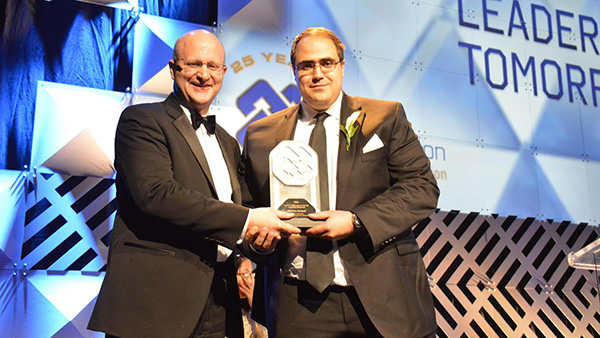
(L-R) Don Scott, minister of Innovation and Advanced Education, presents Matthew Benesch with the 2014 Leaders of Tomorrow award. Photo credit: ASTech Foundation
Matthew Benesch, a MD/PhD candidate in the Faculty of Medicine & Dentistry, recently won the 2014 Leaders of Tomorrow Award presented by the Alberta Science and Technology Foundation (ASTech).
The award is presented to an individual under the age of 30 who exemplifies the qualities expected to make them a future leader in Alberta's science and technology community, while recognizing leadership potential in the areas of science and technology teaching, research, entrepreneurship or in a technology-based business.
Benesch, who was presented with the award by Don Scott, minister of Innovation and Advanced Education, at the ASTech awards gala on Oct. 24, 2014, is currently working on the PhD portion of his combined MD/PhD degree.
According to the ASTech Foundation, Benesch shows incredible promise with his cancer treatment research.
Benesch's research is focused on an enzyme called autotaxin. Autotaxin is produced by the body in response to tissue damage, but in cancer patients the enzyme increases tumor growth and metastasis. Benesch has discovered that tumors cause production of this enzyme to be increased in the surrounding normal tissue, and the cancer cells then use this autotaxin to further grow.
"Despite the best efforts of physicians, many deaths are caused because patients gradually stop responding to their treatment, enabling the cancer to spread throughout the body and establish other tumours," says Benesch. "By understanding this enzyme, there are potential diagnostic and therapeutic benefits."
By inhibiting the production of this enzyme, cancer treatment can be greatly improved, says Benesch. Although Benesch says research on how to inhibit this enzyme has been in the works for more than 20 years, he has been able to achieve some real success.
"In my research, we have successfully tested the first autotaxin inhibitor that is effective in mice and it significantly slows cancer growth and spread," says Benesch. "We have also shown that this drug makes other cancer therapies more effective by blocking the development of treatment resistance. We are now working to test autotaxin inhibitors for the first time in cancer patients starting in early 2015.
"After these trials, this drug can then be used in cancer patients to improve the effectiveness of their current therapies, which would improve patient outcomes," says Benesch.
Benesch says his research is driven by his desire to help people, which is evident in other areas as well: he also volunteers with cancer patients and finds it is the human interaction that encourages his research.
"It's easy to find things to do when it's in your environment," says Benesch. "I've been doing a lot of cancer work and it's easy enough to spend some time and get some perspective by doing some work in the cancer wards."
As for winning the award, Benesch says, "It is an honour and recognizes my involvement in research and the greater university community. The award also helps me realize all the people I work with day-to-day to achieve success and really there are a lot of people I am indebted to for winning the award."
A short video about Matthew Benesch's research can be found on the ASTech website.